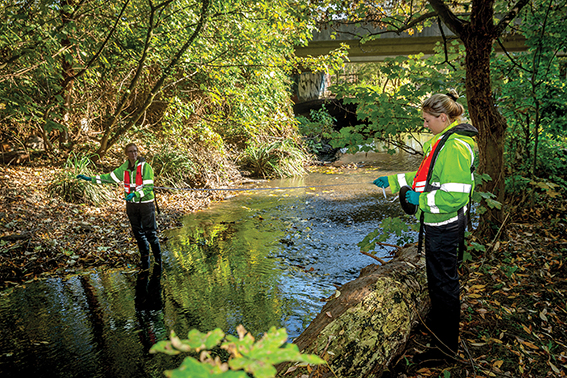Short and long-term solutions to decarbonise the UK water sector.
By Matthew Humphreys National Account Manager, Utilities, Adler and Allan
For the UK water industry, the countdown to carbon neutrality has begun. The sector has committed to reaching Net-Zero by 2030 – an ambitious aim that will save 10 million tonnes of greenhouse gas over the next nine years.
Operators must now develop sustainable CO2 reduction programmes and deliver them two decades ahead of the government’s 2050 decarbonisation deadline. In the face of an ageing infrastructure, strict budgets, and higher-than-ever stakeholder expectations, water companies have their work cut out.
The Water UK Net Zero 2030 Routemap provides a valuable strategic starting point, outlining a ten-step plan and several potential carbon reduction pathways. Along each route, businesses can employ specific interventions that provide both immediate impact and lasting benefits. But with only nine years to carry out the industry’s Net-Zero commitments, change must start now.
Adler and Allan recently took an online temperature check of water suppliers’ progress to date. Encouragingly, respondents to our social media survey had already chosen a primary pathway, with 50% selecting a technology-led approach, two sets of 19% opting for demand-led and removals-led strategies, and 12% following combined methodologies.
However, only one member of our focus group was ‘completely confident’ about reaching Net-Zero by 2030. When asked about decarbonisation activity so far, 19% of participants said they were ahead of target, 30% believed they were on target, and 25% classed themselves as behind. The remaining 26% didn’t know.
The task and time constraints are challenging, but with expert support and a collaborative approach, it’s possible to remove your Net-Zero roadblocks. Let’s explore the pathways, interventions, and partnership possibilities that can quicken your pace to decarbonisation.
Burning fossil fuels interventions
Quick win: Replacing gas oil with HVO
Swapping red diesel for Hydrotreated Vegetable Oil (HVO) – a 100% renewable ‘drop in’ alternative – is a fast, simple, environmentally-friendly fuel strategy. A qualified consultant will perform a detailed asset survey to ensure HVO compatibility, then oversee tank cleaning, inspection, and fuel uplift and replacement. You’ll also receive a comprehensive maintenance schedule to prevent microbial contamination and fuel degradation.
Proactive planning: Transforming sewage sludge into biogas
A pivotal part of Net-Zero success is smarter waste management. Increasing numbers of wastewater facilities have already installed combined heat and power (CHP) engines as part of broader renewable fuel generation programmes.
These units use the natural process of anaerobic digestion (AD) to transform sludge into biogas, which can be used to power site operations, combusted to create electricity and heat, or sold back to the local grid. In turn, the heat generated from CHP facilities can be repurposed to expedite the AD cycle.
Long-term strategy: Planning for sustainable onsite hydrogen production
While still in its infancy, onsite hydrogen production could emerge as the industry’s Net-Zero saviour. Electrolysis can extract hydrogen from partially treated wastewater with no carbon emissions. A possible scenario could involve powering your wastewater plant with hydrogen by day, then continuing electrolysis out of hours. The resultant green energy reserves could be:
Used to fuel company vehicles
Injected into the national grid
Provided to local services, including buses, domestic waste vehicles, and police cars
Sold to hydrogen consumers, such as chemical plants and refineries
Transport interventions
Quick win: Energy efficiency – journey reduction
Every load of effluent and hazardous waste tankered from your site increases your overall carbon emissions. Upgrading your drainage systems minimises wastewater volumes – and the road miles to remove them. A comprehensive programme of waste reduction, recycling, and repurposing will limit the runoff/removal cycle, curb journey requirements, and bring you a sizable step closer to carbon-free practices.
Quick win: Alternative technologies – electric vehicles (EV)
Your fleet is a significant source of emissions – but one of the simplest to address. It’s possible to tick your first box towards Net-Zero within weeks by installing EV charging points across key sites, using ready-to-rollout technology.
A trusted partner can also map your longer-term transition to greener vehicles – from an initial feasibility study through to electrical infrastructure and charging point implementation, commissioning, and sign off.
Long-term strategy: Hydrogen or biogas fuel infrastructures
Hydrogen is fundamental to UK water’s Net-Zero future – and green power for your HGV fleet is already available. A skilled environmental consultant will create a point-by-point conversion plan, including interim adaptations, decommissioning guidance, and support on designing, implementing, and maintaining your hydrogen or biofuel-led infrastructure.
Natural sequestration interventions
Quick win: Planting trees
The water sector has set a collective target to plant 11 million trees by 2030. While trees take decades to effect measurable change on CO2 levels, planting can still be a low-cost, highly visible quick win for water companies.
Working with an ecologist to survey land and select appropriate tree species, yield class, and management practices will ensure your investment enhances native environments and thrives for generations.
Long-term strategy: Peatland restoration
Restoring degraded peatlands reduces a large portion of carbon emissions from natural systems and provides essential biodiversity benefits. A trained environmental consultant can manage the delicate ‘re-wetting’ process, restoring the land’s natural flow of water and soil saturation. They’ll also offer expert support on peatland feasibility surveys, design, excavation, and planting.
Long-term strategy: Grassland restoration
Grassland restoration encompasses a range of techniques that enhance the natural landscape and preserve biodiversity. Working with an environmental specialist removes costly guesswork, providing guidance on your ideal approach – from spontaneous succession to topsoil removal and transfer – as well as strategies to boost species richness within ex-arable spaces.
The transition to Net-Zero will take innovation, proactivity, and shared commitment from the water sector, its stakeholders, and supply chain. The clock is ticking, but a combined effort will make positive change achievable. Working side-by-side with a trusted partner – who understands your risks, requirements, pain points, and opportunities – will speed your decarbonisation journey and help you deliver on your 2030 deadline.
www.adlerandallan.co.uk/expertise/sectors/




